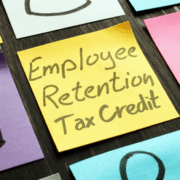Employee Retention Tax Credit
The Employee Retention Tax Credit (ERC) has become a household term. At one time, ERC was reported only by news stations and scholarly publications, but now can be seen or heard on advertisements across all avenues of mainstream media. Considering recent news releases from the Internal Revenue Service, I want to take some time to share with you an ERC update.
The ERC was established by the Coronavirus Aid, Relief, and Economic Security Acts (CARES Act) in March 2020 as a means to stimulate the economy. This credit aimed to assist businesses facing hardships from the pandemic by incentivizing those employers who retained their employees. Initially, the eligibility periods for the ERC was March 2020 through December 2020. Additional laws were passed after the CARES Act that expanded the eligibility periods into 2021. There are several criteria for a business to qualify for the ERC, but to simplify, there are two main criteria that would qualify a business as eligible. The first way a business could qualify for the credit is to be affected by government mandated closures. The second way a business could qualify is for certain levels of revenue declines in specified periods.
Let’s assume that a business retained an employee throughout all the ERC eligible periods and met all the appropriate criteria to receive each piece of the ERC. The maximum benefit that the employer could receive for that single employee is $26,000. Imagine a business with ten employees, maximum eligible benefit could be $260,000! (Queue the fraudsters)
Now, it is time to discuss the current landscape of the ERC. Due to IRS concerns of improper claims, there has been a temporary postponement on processing any new ERC claims through, at least, the end of 2023. The IRS believes there has been a rise in claims due to business owners being scammed into allowing a third party to submit a fraudulent claim(s) on their behalf. The fraudsters will charge a fee for preparing the ERC claim, collect their fee and then vanish, moving on to their next victim.
Fast forward some months, the IRS audits the ERC claim and determines a fraudulent claim. They let the business owner know of their findings and direct them that they must repay the ERC, likely with penalties and interest. Unfortunately, the fraudster cannot be reached for assistance or to request a refund for their “services.” Instead, you will have to hire another professional for assistance. Filing a fraudulent claim becomes detrimental to a business that is already suffering from pandemic era hardship.
The IRS has produced a list of warning signs they have identified to help business owners stay clear of aggressive ERC marketing:
- unsolicited calls or advertisements mentioning an “easy application process,”
- promoter stating they can determine ERC eligibility within minutes,
- promoters claiming that a business qualifies for the ERC before any discussion of the business’s tax situation,
- large upfront fees to claim the credit,
- fees based on a percentage of the ERC refund obtained, and
- promoters that refuse to sign or supply their identifying information on the business’ return(s) claiming the ERC.
Ensuring that you are working with a qualified professional that you can trust, such as a Certified Public Accountant, will make sure that you are not on the hook for someone else’s get rich quick scam.
Published in the Victoria Advocate
Christopher Laughhunn CPA/CFP® is the Tax & Accounting Principal for Keller & Associates CPAs, PLLC and an Associate Advisor for KMH Wealth Management, LLC.



